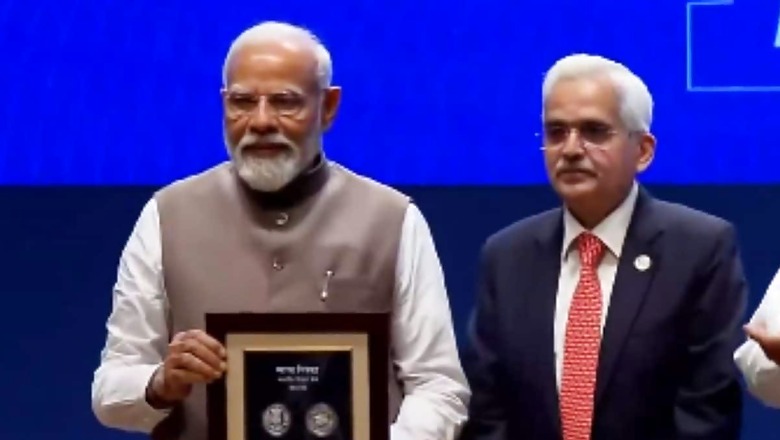
views
Congratulating the Reserve Bank of India on completing 90 years of service, Prime Minister Narendra Modi said the Central bank entered a historic phase today. Addressing a ceremony marking the anniversary celebrations in Mumbai, the Prime Minister said RBI is known in the world for its professionalism and commitment.
PM Modi said the banking sector has become profitable and credit growth has been increasing because of efforts taken by his government and the RBI in the last decade.
“In 2014, when I attended the program for the completion of 80 years of the RBI, the situation was very different. The entire banking sector of India was struggling with problems and challenges. Everyone was doubtful regarding the stability and future of India’s banking system. The situation was so bad that the Public Sector banks were not able to provide enough boost to the country’s economic progress… And today, India’s banking system is seen as a strong and sustainable banking system in the world,” he said
PM Modi said this changed because his government has clear policies, honesty, and commitment.
“Our efforts had stability and honesty. When the intentions are clear, then the policies are right. When policies are right, then the decisions are right. And when the decisions are right, the results are also right,” he stressed.
The Prime Minister stressed that India’s GDP is dependent on coordination between monetary and fiscal policies
“Transformation of the Indian banking sector is a case study, govt infused Rs 3.5 lakh crore capital in PSU banks for their revival. NPAs in banks have fallen to less than 3 pc in September 2023 from a record high of 11.25 pc in 2018; credit growth at 15 PC,” he noted.
He also stressed upon easy access to credit in India, which in turn promotes ease of doing banking. “UPI has become a globally recognised platform; RBI is also working on central bank digital currency,” he said.
The RBI has played a significant role in all these accomplishments, said PM Modi, adding that the central bank’s monetary policy committee has worked very well on inflation targeting.
“The last 10 years were just a trailer. We have to do a lot more to take forward our country. We gave inflation-targeting authority to RBI… Indian economy making new records when several economies are struggling to come out of the Covid pandemic impact… Inflation was at a moderate level even during the Covid pandemic, wars or any other external factor,” he said.
He further stressed that India needs to become economically self-reliant in the next 10 years so that the nation is not impacted much by global factors.
“A lot of work will be generated for everyone once the BJP-led NDA assumes office for the third term in June…We have to increase India’s economic self-reliance,” he said.
“I am busy with the elections for these 100 days, so you have a lot of time to think about (new policies). Because just a day after the swearing-in ceremony, you will have a lot of work,” PM Modi added.
PM Modi released a commemorative coin on the 90th anniversary of RBI. Union Finance Minister Nirmala Sitharaman and RBI Governor Shaktikanta Das also attended the event.
RBI At 90
Established in 1935, RBI functions as the nation’s central bank, following the recommendations of the Hilton Young Commission and is governed by the Reserve Bank of India Act, of 1934.
The functioning of this central bank is governed by the Reserve Bank of India Act, 1934 (II of 1934), and it began operations on April 1, 1935, with Sir Osborne Smith as the first Governor, responsible for functions such as currency issuance, banking services for banks and the government, and the development of rural cooperatives and agricultural credit.
In 1937, the Central Office of the Reserve Bank was also shifted from Kolkata to Mumbai.
The RBI’s role has expanded to cover monetary management, regulation and supervision of the financial system, management of foreign exchange, currency issuance, regulation and supervision of payment and settlement systems, and developmental roles over the years.




















Comments
0 comment